More U.S. tariffs would be ‘very damaging,’ auto industry tells MPs
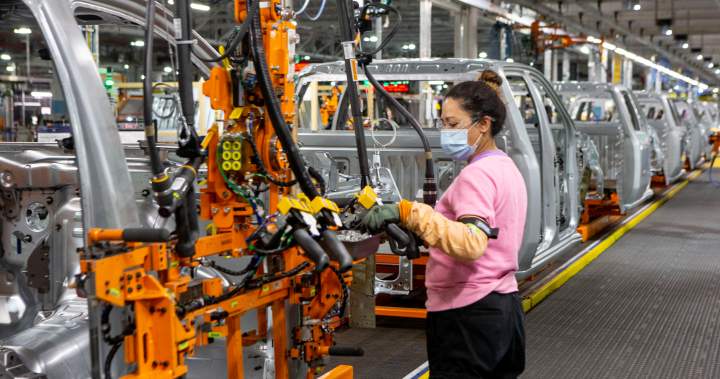
Canada’s automotive industry is sounding the alarm that it would be “very damaging” if more tariffs are put into place — and also that some vehicle manufacturers are voicing concern about being seen as “too American” in the tense climate.
This comes after U.S. President Donald Trump abruptly cut off trade talks and declared he would add a 10 per cent tariff on top of current levies in place on Canada — a move Trump said was because of an anti-tariff commercial produced by the Government of Ontario.
A panel of representatives from Canada’s automotive sector met with a federal standing committee in Ottawa Monday to discuss the “challenging” environment that tariffs and the trade war have created.
“It would be extremely challenging if more tariffs go into place, particularly if they apply to all products that currently qualify under CUSMA,” said Brian Kingston, president and chief executive officer of the Canadian Vehicle Manufacturers’ Association (CVMA).
“So we don’t know yet how these will be applied, but an additional 10 per cent will be billions of dollars in costs onto this sector (automotive) and other Canadian sectors. So very damaging and hopefully we can find an off-ramp.”
Trump was not clear if the additional tariffs would apply to all sectors, or specifically-targeted industries, and on Monday did not say when asked when those might go into effect.
Carney responded to Trump pulling the plug on trade negotiations, saying, “We can’t control the trade policy of the United States.”

Trump’s tariff policies mean products may face additional costs if they do not fall under the terms of the Canada-United States-Mexico Agreement (CUSMA), which is set for a formal review in 2026.
Companies in many sectors, including automotive, have been pivoting to find alternative trading partners and adjusting their supply chains to avoid, or at least minimize the cost impact from tariffs.

Get daily National news
Get the day’s top news, political, economic, and current affairs headlines, delivered to your inbox once a day.
Some car companies warned tariffs could see their profits drop by billions of dollars by the end of 2025, with some shifting or closing production in Canada, which has led to job cuts.
Stellantis revealed earlier in October that it was planning on moving production of the Jeep Compass from Brampton, Ont., to Illinois in the U.S. — leaving thousands of jobs at risk of being eliminated.
Kingston on Monday was asked about the job security for Brampton workers at the Stellantis facility, and he said “there are plans for the Brampton plant — it is not a plant closure,” without getting into specifics.
General Motors also said it is ending production of its BrightDrop vehicles in Ontario.
In light of the Stellantis and General Motors news, Industry Minister Melanie Joly formed a “response group” aimed at preserving jobs.
Kingston added that there could be further plant closures and potential job cuts “the longer time goes by without a solid trade deal” that makes Canada a “competitive” market for companies to invest in.
When companies are hit by higher costs, they typically will try to offset the hit to their profits by increasing prices for customers. This means by having to pay tariffs, companies like Stellantis may have to increase prices for car buyers.
“You’re going to see vehicle prices go up US$4,000, $12,00, $15,000 — I don’t think people signed up for that. That is a potential outcome, but I ultimately think we will find a landing zone,” Kingston said.
Huw Williams, the national spokesperson for the Canadian Automobile Dealers Association, told the committee one of his client’s concerns was how “a number of our dealers, Ford, GM and Stellantis are worried about the knock-on effect of being seen as ‘too American.’”
A recent Ipsos poll conducted exclusively for Global News showed six in 10 Canadians said they could never trust the U.S. again because of Trump’s policies.
Trump has also repeated rhetoric that Canada should become “the 51st state” to avoid paying tariffs.

The panel was adamant that the best way forward to support the Canadian automotive sector and its workers is to negotiate a trade deal that sees all tariffs removed for finished vehicles and components crossing the Canada-U.S. border.
“The best deal for Canada is a situation where we adhere to the rules that were negotiated under the previous CUSMA. If those conditions are adhered to, then that should be the basis on which we continue to have zero tariffs on automobiles going back and forth across the border — and that’s where we need to get to,” said David Adams, president and CEO of Global Automakers of Canada.
“I think some people are saying ‘that’s wishful thinking.’ Well, maybe that’s one of the reasons why the negotiations are taking so long is because that’s the ultimate goal here.”
Williams also suggested that having a long-term trade deal may be worth waiting for.
“We’re concerned about getting a long-term deal. Yes, we need short-term certainty, but the big prize out here is to make sure we have a CUSMA deal.”
© 2025 Global News, a division of Corus Entertainment Inc.

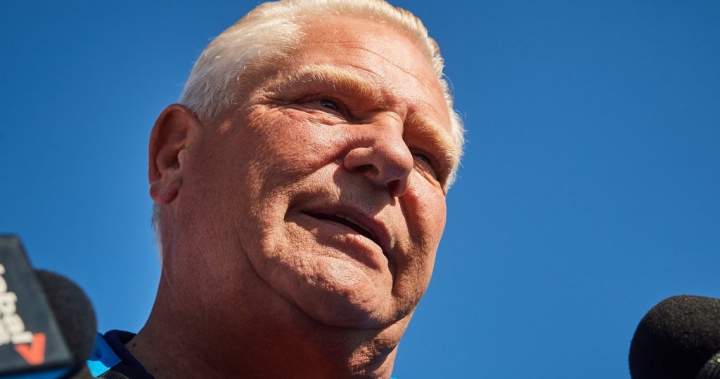
Ontario Premier Doug Ford says he has left his team to figure out how to crack down on those profiting from resold baseball tickets but doesn’t have a solution to announce as the Toronto Blue Jays’ World Series run heads into Game 4.
As tickets to catch a moment of the Toronto Blue Jays’ post-season run sold for thousands, Ford had mused about reviving anti-scalping legislation his government killed shortly after it originally came to power.
On Tuesday, the premier insisted he was still looking at the idea, although he doesn’t have a timeline, suggesting it is likely not to come in until long after the Toronto Blue Jays versus Los Angeles Dodgers series has ended.
“We’re working on it right now because people shouldn’t be gouged and that’s what’s happening right now, no matter if it’s the World Series or a concert comes in,” Ford said.
“I left it with our team to come up with a few solutions to make sure it’s fair for the average person to be able to go to a game because right now, what I’ve seen, especially the World Series, any big concerts coming to town, certain companies are gouging the people.”

Get breaking National news
For news impacting Canada and around the world, sign up for breaking news alerts delivered directly to you when they happen.
Ford first suggested he was open to the idea last week; however, his government has since voted down opposition efforts to immediately introduce measures to protect fans.
“People deserve a break from the stressors of daily life and be able to go to a concert or a sports game without paying outrageous prices. Ford’s Conservatives chose to protect ticket scalpers and lobbyists instead,” Ontario Libreal MPP Tyler Watt said in a statement.
The idea was floated as Blue Jays fans took to social media to vent their frustration at post-season tickets costing thousands of dollars.
The anger over price resales is not new, with anger erupting last year during Taylor Swift’s Eras Tour, which saw similar ticket prices and frustration.
Ford’s government previously scrapped part of a law that would have capped ticket resale prices at 50 per cent above the original face value.
A section in the previous Liberal government’s Ticket Sales Act would have imposed that cap, but the Progressive Conservatives paused implementing it shortly after the 2018 election.
A year later, in 2019, it cancelled the rule, saying it was unenforceable and that it would have driven consumers to buy tickets on the black market and drive costs higher.
Opposition parties have indicated they would support bringing the law back.
— With files from Global News’ Sean Previl
© 2025 Global News, a division of Corus Entertainment Inc.
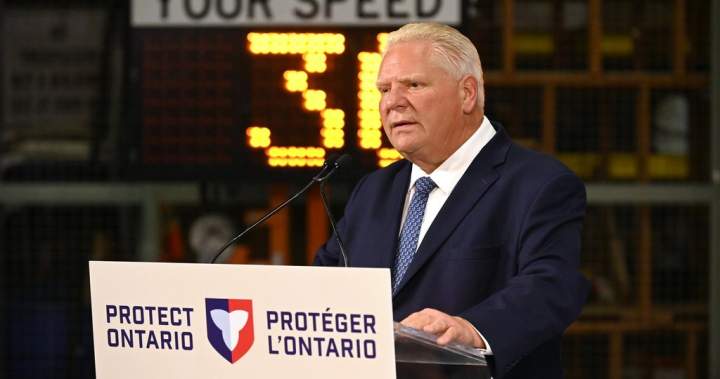
Ontario Premier Doug Ford’s government is proposing to limit debate and avoid public input on three pieces of legislation, including one that would end the province’s speed camera program.
Government House Leader Steve Clark is proposing to fast track a red tape reduction bill that includes banning speed cameras, a labour bill and an emergency management bill.
Clark’s proposal indicates the government plans to stop any further debate at the second reading stage for the three bills, then entirely bypass the committee stage that usually follows — a time to hear from the public on the bill and make any amendments — and limit debate time for the final, third reading stage.
Ford has been vocal over the past couple of months in his opposition to speed cameras, calling them a “cash grab” only meant to generate revenue for municipalities, but the communities themselves, as well as parents, police chiefs and researchers at the Hospital for Sick Children have said they save lives and should stay.
Clark said the ministers responsible indicated they were good with the debate that had already occurred in the House for second reading, and the premier has signalled his keen interest in enacting the red tape reduction law.

Get breaking National news
For news impacting Canada and around the world, sign up for breaking news alerts delivered directly to you when they happen.
“It’s a priority of the government that clearly was indicated right at the highest levels,” Clark said after question period. “That’s why I scheduled it the way I did.”
NDP Leader Marit Stiles said matters in all three of the bills deserve public scrutiny and attention, but this government is not interested in debating the issues.
“They want to push through things,” she said. “They don’t want to have any opportunity for the public, or people who are going to be impacted by legislation, to have a say in the decisions that are going to impact them. It’s more of the same, but it’s getting worse and not better.”
The government limited debate and committee time on numerous bills in the legislature’s spring sitting, and Liberal parliamentary leader John Fraser said it feels like Groundhog Day as the government already starts bypassing normal processes in week two of the fall sitting.
“They just figure they can do whatever they want, and that people aren’t paying attention,” he said.
“You’ve got to take time. You’ve got to get it right. You’ve got to listen to the other side. And the government’s not listening … When you fast track stuff like this the way that they’re doing it, it doesn’t serve anybody, and it makes for really bad pieces of legislation.”
More than 20 mayors from across the province have asked Ford to tweak the speed camera program instead of scrapping it entirely, but Ford quickly shut them down.
Ford has said he doesn’t believe speed cameras work to prevent speeding, saying traffic calming measures such as speed bumps, roundabouts and big signs with flashing lights are more effective.
Data from several municipalities that have analyzed the effect of the cameras on traffic speeds, as well as a different study from SickKids and Toronto Metropolitan University, show speeds are reduced.
The red tape bill would also allow for greater movement of workers, largely in health care, between provinces and “streamline” the Clean Water Act.
The labour bill includes requiring automatic external defibrillators on construction sites and requiring job posting platforms to have mechanisms to report fraudulent job advertisements. The emergency management bill sets out roles and responsibilities the government says would enable better communication and co-ordination.
© 2025 The Canadian Press
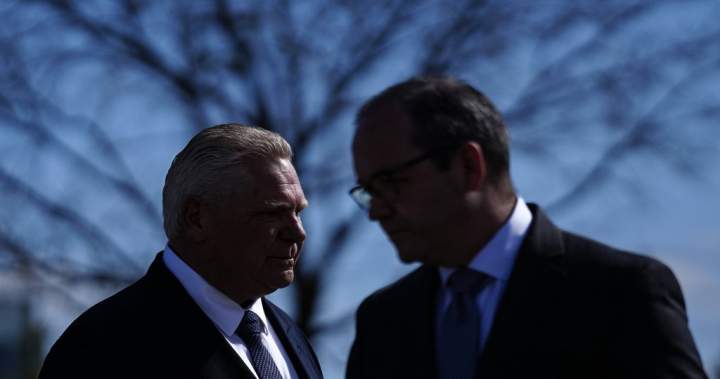
Ontario Premier Doug Ford is defending his plans to scrap fixed election dates and significantly hike donation limits for political parties, calling one of the rules he is scrapping a “fake law.”
The Ford government announced on Monday afternoon it intended to make major changes to the rules governing elections in Ontario as part of its Fall Economic Statement, including to donations, spending and the date voters head to the polls.
The latter change would abolish the existing fixed election date for Ontario. Under the current rules, an election would have been held in 2029, four years after Ford’s snap win earlier this year. Instead, the premier will now be able to serve the full constitutional term of up to five years.
Asked about the change, Ford said he didn’t know if he’d call the next election in three, four or five years.
“As far as this is concerned, that’s a fake law put in by the Liberal government,” he told reporters on Tuesday.

Get breaking National news
For news impacting Canada and around the world, sign up for breaking news alerts delivered directly to you when they happen.
“We’re going to move forward and call an election when the time is appropriate. I think it’s up to five years, but could be four, could be three.”
Ontario’s fixed election dates were enacted about 20 years ago by then-premier Dalton McGuinty. Although the law provided a date for the election, it was still possible for premiers to dissolve the legislature early, as Ford did for February’s snap election, which he won for a third successive majority.
During that same election, the Ontario Progressive Conservative party asked voters for a “strong, four-year mandate” to eclipse U.S. President Donald Trump’s second term in office. The party didn’t include plans to overhaul election laws in its campaign platform.
The changes announced by the Ford government for elections also raised the donations people can make to political parties by almost 50 per cent, to $5,000.
Opposition parties say the changes come at a time when the Ford government is under scrutiny for how it handed out public dollars through the skills development fund, including to applicants associated with donors and lobbyists.
“Very few people could afford that,” NDP Leader Marit Stiles said of the $5,000 donation limit. “What it tells me is that under the Ford government, only people with very deep pockets are going to have any influence.”
Global News asked Premier Ford whether regular Ontarians would be able to afford to donate $5,000. Ford said he was increasing the limit to bring Ontario in line with other, higher-donor political races.
“You can donate $5,000 to a mayoral candidate, why can’t you do it here? It’s very similar to other provinces across the country, so we’re just keeping up to the balance of the other provinces,” he said.
In Toronto, the individual donor limit for mayoral campaigns is actually $2,500.
The election changes, which will be included in the Fall Economic Statement next month, also include:
- The per-vote subsidy, which gives public money to political parties based on how many votes they receive, would be made permanent, rather than needing to be regularly extended.
- Strict spending limits on third-party advocacy groups — for example, unions — and political parties would be eliminated.
- Tighten the rules around third-party advertising registration and give Ontario’s chief electoral officer more investigative powers to deal with bad actors.
- Potentially ban political advertising on government property, which would include billboards and transit stations.
© 2025 Global News, a division of Corus Entertainment Inc.
-

 Uncategorized5 months ago
Uncategorized5 months agoShop Proud, Eat Proud, Be Proud — Ottawa Canada Day Market This June 28th
-

 4 months ago
4 months agoRing of Fire road to bring prosperity to First Nation, problems for caribou: report
-

 5 months ago
5 months agoMeasles circulating in northeastern B.C. community, health officials warn
-

 5 months ago
5 months agoCanada’s world junior trial saw juries tossed, intense testimony. Here’s a recap
-

 4 months ago
4 months agoFormer major leaguer, Jays doctor Ron Taylor dies
-

 4 months ago
4 months ago161 bricks of suspected cocaine found on truck trying to cross Canada-U.S. border
-
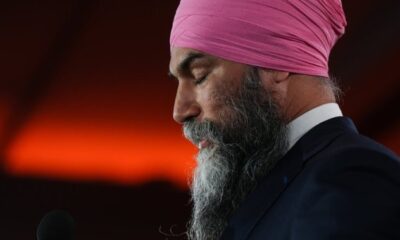
 4 months ago
4 months agoJagmeet Singh apologizes for attending Kendrick Lamar concert after Drake calls him out
-

 5 months ago
5 months agoAnishinabek Nation chief says he briefed Ontario police on protests against Bill 5





